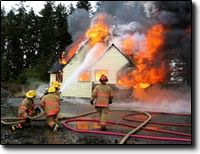
Use Your Insurance Policy To Fight Your Fire Claims Dispute!
As if having a devastating fire that damages everything in a home or business isn't enough, the second catastrophe can be dealing with an insurance company or adjuster. Fire insurance claims are very complex due to the large amount of damage they cause. It's not long before the two sides are in a dispute about what should be repaired and what should be replaced.
In many cases the insurance company wants to live up to their end of the bargain and pay for the damages incurred. However, more and more policyholders are finding themselves fighting with insurance company representatives that act like the policyholder is trying to take "their personal money." It's not the adjusters money, or the insurance company's money, IT'S YOUR MONEY. You are entitled to the full "Amount of Loss," for the damages incurred.
Disputes From Fire Insurance Claims Usually Arise From The Huge Difference Between The Insurance Company's Estimate & The Contractor's Estimate
In many situations the insurance adjuster who visits the fire damaged property is not, nor has ever been, a contractor. For this reason the policyholder is now faced with an insurance company estimate that is missing many repair items, or the item prices are lower. As a result, the insurance company's estimate and the contractor's estimate is thousands, tens of thousands, or even hundreds of thousands of dollars off. In reality, most insurance adjusters take classes to learn about insurance policies - and classes to lean about building materials... but have never been a roofer, carpenter, painter, or carpet installer. They have very little or absolutely no hands-on experience, no on-the-job experience, or any experience with the materials or procedures they are estimating.
Insurance companies make some policyholders believe that they must use "Insurance Company Approved" contractors to repair or replace their property (home, building, furniture, clothing, etc.). The truth is; you can use whomever you wish. It does not have to be the lowest price either. You choose who you feel most comfortable with, period. Now, the insurance company has the right to negotiate an agreed price with your contractor or review estimates to be sure they are not padding or boosting the costs. Many contractors will do that. They realize that the costs are being paid by the insurance company and not directly from the owner, so they increase prices and try to obtain higher profits than what the repair or replacement actually costs.
Most Insurance Company Adjusters Are Not Qualified To Estimate Fire Insurance Claims
In reality, most insurance adjusters take classes to learn about insurance policies and classes to lean about insurance estimating software... but have never been a roofer, carpenter, painter, or carpet installer. They lack the hands-on experience and knowledge of a person who has many years experience repairing or replacing such damages. It's easy to see how the dispute arises with fire insurance claims. It usually sounds a bit like this...
The insurance company sends an adjuster to the fire loss location. The adjuster seems to spend very little time inspecting the claim and determines the fire damages to be $150,000. However, the policyholder has several bids from different contractors with estimates of repair for $250,000 and higher. Many times it seems the insurance company is trying to repair or clean damaged items and the contractors have provided pricing to replace them. It's not long before a dispute between the cost of repairs begins and an agreement on the costs cannot be reached.
When such a dispute arises there is a clause in most insurance policies called Appraisal. The insurance appraisal clause is usually a new term to most policyholders. However, more and more policyholders find themselves disagreeing with their insurance company adjuster's estimate of their fire damage claims. Those who do; should educate themselves on the insurance appraisal clause, how to use it, when to use it, and why to use it. For many fire claims the only available option to resolve a dispute is the clause buried in the "Conditions" or "What to do after a loss," sections of their policy. It's called The Appraisal Clause - also know as The Appraisal Provision.
In most cases the insurance company invokes the insurance appraisal clause more often than policyholders do. Only because they have a better understanding of the terms and conditions of the policies. If your insurance company has invoked appraisal on your claim, or if they advised you that if you disagree you can invoke appraisal, you're in the right place. Even if you're just searching for information on what your options are if you disagree with them - you're still in the right place. It may seem like a fancy clause that would take a law degree to understand. The simplest way to understand it is that it's the insurance industries version of an arbitration. However, it's not actually an arbitration. (What's the difference between arbitration and the insurance appraisal clause?)
Appraisal Clause In The Policy!
Below, you will find the wording of a typical Appraisal Clause included in most policies. As stated; the appraisal clause is usually found in the "Conditions" or "What to do after a loss," sections of the policy. Keep in mind that each state many have different wording in the clause. However, they are all similar and basically mean the same thing... The Rules On Disputing The Amount Of Loss On A An Insurance Claim. Therefore, all policyholders should refer to their own policy to see if the appraisal clause exists and what it says. In most policies the Insurance Appraisal Clause States:
APPRAISAL - If you and we fail to agree on the amount of loss, either one can demand that the amount of the loss be set by appraisal. If either makes a written demand for appraisal, each shall select a competent, independent appraiser. Each shall notify the other of the appraiser's identity within 20 days of receipt of the written demand. The two appraisers shall then select a competent, impartial umpire. If the two appraisers are unable to agree upon an umpire within 15 days, you or we can ask a judge of a court of record in the state where the residence premises is located to select an umpire. The appraisers shall then set the amount of the loss. If the appraisers fail to agree within a reasonable time, they shall submit their differences to the umpire. Written agreement signed by any two of these three shall set the amount of the loss.
If You Wish To Dispute Your Claim
If you really wish to stop the bleeding and the endless back-and-forth disagreement with your insurance company, then the appraisal clause is really your only hope. When the parties can't come to terms and disagree, either the insurance company or the policyholder has the right, per the policy, to demand appraisal. When the intent to invoke the insurance appraisal clause arises it must be issued via a written request. To resolve such disputes, each party must choose an appraiser. Fire Insurance Claims and Disputes is what we do.
Insurance Claims Group, Inc. exceeds in their knowledge of the appraisal process and fire damage claims. We're available to represent the facts of the loss on your behalf. To execute the job as your independent insurance appraiser properly, not only should one be educated in the process, but one should also be qualified to review the differences between the two parties. Our extensive experience with fire insurance claims, construction, building repairs, building materials, and the insurance appraisal process qualifies us as a choice above all.
  What We Do As A Fire Damage Appraiser! What We Do As A Fire Damage Appraiser!
The first step to our fire appraisal process is to obtain as much documentation that is available on the claim. We will collect a copy of the insurance company's fire damage estimate(s), the policyholder's fire damage estimate(s), as well as any other documentation that is available. We will vigorously review and inspect each estimate line-by-line for discrepancies.
The next step will be to inspect the property that has been damaged by the fire. A thorough inspection will be conducted, room by room, and piece by piece (or any remaining parts). We will conduct this inspection with the two different fire damage estimates that are being disputed. With these estimates in hand during our inspection we can determine if one estimate has missed items to be addressed and/or if the other is excessive.
Our inspection will include 50 to 300 photos (depending on the size of the fire loss and extent of fire damage). These photos will prove and support our findings. The photos will be taken in a manner that supports our position of whether items can be saved or will require replacement. The photos will also show cause and affect damages. Yes, the bricks on the exterior of a home or building may not appear to be damaged by the fire. However, if the sheathing/plywood behind the brick is smoked and damp - the bricks will require removal to access other repairs.
Some rooms or even an entire building may be fire damaged beyond recognition. In these cases we will conduct an interview process with the owners of the property to confirm room layouts, types of wall and floor finishes, electrical items, cabinetry, and more. This type of questions and answer session will paint a clear picture of the TRUE value of the damages the fire caused. The proper value of the claim depends on it's accuracy.
All the data collected will then be programmed into the Xactimate estimating software. Xactimate configures and displays the data in the exact format that the insurance companies require. Line by line, piece by piece, the exact square feet of drywall, paint, wallpaper, and carpet will be calculated for a real and accurate cost to pay the claim. In fact, Xactimate is used by more than 70% of insurance companies.
Any items that are in question will be reviewed by our group of engineers, building inspectors, or contractors as additional documentation to support the true repairs. Foundations, brick, support beans, and electrical may require removal and may not meet current building codes. These professionals can advise on ways to keep these types of materials or why they will require replacement.
After all this has been completed we will meet with the other parties appraiser and discuss each others findings. In some cases an agreement cannot be reached between the two appraisers. In the event this happens, the two appraisers will submit their differences to the Appraisal Umpire.
Contact Us For Free Consultation!
Should you invoke appraisal? How much will it cost? Is Insurance Claims Group the right fit for your appraisal needs? How do you know unless you ask? Please feel free to contact me by email to set up a date and time to to discuss your Insurance Appraisal needs. Or, call me directly at (919) 669-9111. I will be happy to assist you in any way I can.
For an overview of the entire appraisal process visit the Insurance Appraisal Process page or more details. Thanks for visiting Fire Insurance Claims.
We provide Fire Insurance Claims Help as independent appraisers for the insurance appraisal process in multiple states. We have personally adjusted fire insurance claims, represent clients as an independent fire appraiser, and have been requested as an Insurance Appraisal Umpire for fire insurance claims in the following states;
Resources:
|

